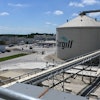The U.S. Department of Agriculture ushered in the new year at the American Farm Bureau Federation Annual Meeting on January 9, with Secretary Tom Vilsack's announcement of USDA's "Blueprint for Better Services." This initiative will close 259 USDA offices across the country in 2012. Vilsack explained that the closures were required because the operating budget for USDA has been cut by $3 billion between 2010 and 2012. He assured the nation that the closures in the food safety area "are about administrative personnel, not inspectors" and "will have no impact whatsoever on our responsibility to ensure the safety of the food supply."
A month after the closures were announced, the reactions of American agriculture have varied among different industry segments and the various USDA programs that serve them. We look at three of the most important reactions.
Farmers and FSA Closures
The largest and most heated response has been farmers' reaction to closure of 131 Farm Service Agency (FSA) offices in 32 states. The offices to be closed are small facilities scattered throughout rural areas, where one or two USDA employees provide farmers with information about, and assistance in applying for, a number of USDA programs, including disaster assistance, farm loans, and crop subsidies. All are within 20 miles of another USDA facility that will not be closed. The network of small, dispersed offices was created because (1) decentralized personal assistance was deemed helpful to farmers' participation in USDA programs; and (2) many rural congressmen earmarked these offices to spread "pork" throughout their districts. USDA asserts that internet technology now permits farmers to apply for programs at significant cost savings without face-to-face meetings with USDA personnel, and that today's politics makes deficit reduction more important than maintenance of local offices.
A number of congressmen and county commissioners representing rural areas have objected to the reduction of particular FSA offices in their neighborhoods. They argue that most farmers complete program applications by hand and that federal regulations imposing fines on farmers for improperly-filled-out forms make it extremely risky to use less reliable internet systems. They predict that the result of the closures will be decreased participation in federal agriculture programs. USDA admits its current computer programs are complex but promises more state-of-the-art, user-friendly software by 2013, when updates that are part of its MIDAS ("Modernize and Innovate the Delivery of Agriculture Systems") initiative become effective.
Scientists and ARS Labs
USDA's plan to close twelve research programs at ten Agriculture Research Service (ARS) locations have drawn some reasoned objections from the scientific community. Scientists at labs scheduled for closure and nearby farmers growing crops affected by their research argue that research programs have been purposely located near the crops and pests they study, and that the programs will not be feasible—either economically or technically—if they are relocated to distant, different climate and crop environments. This complaint has been asserted, for example, against the closures of a South Texas lab studying invasive insect and weed species crossing over the Rio Grande from Mexico; a research facility in Florida studying subtropical diseases; and a cotton research station in Kern County, California, studying serious threats to the California cotton crop.
Food Processors and FSIS District Offices
The most dramatic change—from a bureaucratic standpoint—in USDA's plan is the closure of five Food Safety Inspection Service (FSIS) district offices in Minneapolis, Minnesota; Madison, Wisconsin; Lawrence, Kansas; Beltsville, Maryland; and Albany, New York. These five district offices currently oversee FSIS work in 20 states—a tier of 14 northern states from Montana to Maine and six border states: Kansas, Missouri, Maryland, Delaware, Virginia, and West Virginia—which will have to be reassigned to one of the ten remaining district offices.
Despite the importance of FSIS's food safety mission, these closures have generated little objection from industry or its critics. There appear to be two principal reasons for this silence. First, much of U.S. food production is not regulated by FSIS. FSIS oversees only meat, poultry, and processed egg product plants. All other food processors are inspected by the Food and Drug Administration (FDA) and, therefore, are unaffected by restructuring at FSIS.
Second, meat packers, poultry processors, and food safety advocates have not challenged Secretary Vilsack's statements that the closures will affect only "administration" and not "inspection." A typical plant already has an everyday, on-site FSIS inspector at the plant who has two levels of supervisors (a supervisory veterinarian medical officer, who reports to a front line supervisor) between him and the FSIS district office. Thus, consolidation of functions at four-level distance from the plant should have little impact on day-to-day operations.
A Precursor of Bigger Reorganization to Come?
The current emphasis on cost-cutting and deficit reduction should result in USDA's office closures being put into effect. Other recent developments indicate that the same budget pressures may force a much more significant reorganization of federal food safety agencies, and that USDA's closure of FSIS offices may be only a first step.
The possibility of major reorganization was raised on March 2, 2011, in the General Accountability Office report that proposed consolidating USDA's FSIS with FDA (in the Department of Health and Human Services) and 15 other agencies with food safety functions, to form a unified food safety agency. This proposal has recently been revived.
In January 2012, the Obama Administration asked Congress for authority to consolidate federal agencies in order to create efficiencies and save costs. It stated that its first effort would be to combine six business and trade-related agencies. White House Office of Management and Budget (OMB) officials stated that consolidation of FSIS, FDA, and other food safety agencies was second on their list. After some adverse comments from agriculture industry and consumer advocates, OMB modified this statement on January 26, 2012 by saying that it had not yet confirmed any proposals for agency consolidation beyond the initial combination of trade organizations, and that it would not do so until Congress has given President Obama the authority to consolidate agencies.
Reading these tea leaves, it appears that the FSIS-FDA consolidation has been seriously, and favorably, studied by OMB, but is "not confirmed." However, it may well take place if Congress grants the President authority to reorganize. If this dramatic reorganization advances, it will create a new order of food safety oversight in the U.S. and raise significant regulatory and budgetary issues. All interested parties should stay tuned.





















